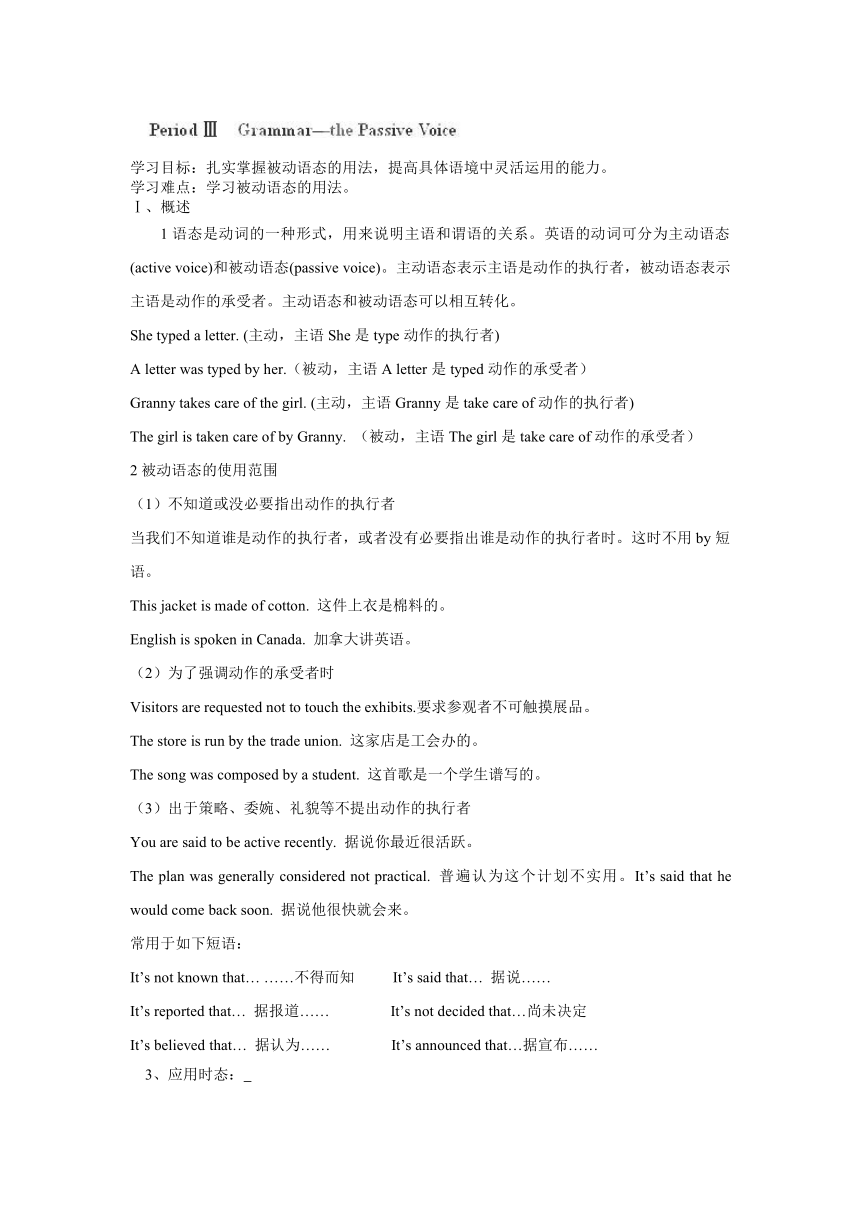陕西省延长县中学高一英语导学案:Module_4_Great_Scientists-Period_3(外研版必修4)
文档属性
| 名称 | 陕西省延长县中学高一英语导学案:Module_4_Great_Scientists-Period_3(外研版必修4) |

|
|
| 格式 | zip | ||
| 文件大小 | 18.1KB | ||
| 资源类型 | 教案 | ||
| 版本资源 | 外研版 | ||
| 科目 | 英语 | ||
| 更新时间 | 2012-09-17 00:00:00 | ||
图片预览

文档简介
学习目标:扎实掌握被动语态的用法,提高具体语境中灵活运用的能力。
学习难点:学习被动语态的用法。
Ⅰ、概述
1语态是动词的一种形式,用来说明主语和谓语的关系。英语的动词可分为主动语态(active voice)和被动语态(passive voice)。主动语态表示主语是动作的执行者,被动语态表示主语是动作的承受者。主动语态和被动语态可以相互转化。
She typed a letter. (主动,主语She是type动作的执行者)
A letter was typed by her.(被动,主语A letter是typed动作的承受者)
Granny takes care of the girl. (主动,主语Granny是take care of动作的执行者)
The girl is taken care of by Granny. (被动,主语The girl是take care of动作的承受者)
2被动语态的使用范围
(1)不知道或没必要指出动作的执行者
当我们不知道谁是动作的执行者,或者没有必要指出谁是动作的执行者时。这时不用by短语。
This jacket is made of cotton. 这件上衣是棉料的。
English is spoken in Canada. 加拿大讲英语。
(2)为了强调动作的承受者时
Visitors are requested not to touch the exhibits.要求参观者不可触摸展品。
The store is run by the trade union. 这家店是工会办的。
The song was composed by a student. 这首歌是一个学生谱写的。
(3)出于策略、委婉、礼貌等不提出动作的执行者
You are said to be active recently. 据说你最近很活跃。
The plan was generally considered not practical. 普遍认为这个计划不实用。It’s said that he would come back soon. 据说他很快就会来。
常用于如下短语:
It’s not known that… ……不得而知 It’s said that… 据说……
It’s reported that… 据报道…… It’s not decided that…尚未决定
It’s believed that… 据认为…… It’s announced that…据宣布……
3、应用时态:
时态 动词形式
一般现在时
一般过去时
一般将来时
现在进行时
过去进行时
现在完成时
过去完成时
过去将来时
4、注意事项:①情态动词的被动形式 ②不定式的被动语态(有些情况则由主动表被动) ③短语动词的被动语态 ④有的被动形式则表示状态而非被动之意 ⑤过去分词作状语时,及物动词表被动,(无需be动词)不及物动词表完成,⑥动名词的被动语态。
Ⅱ. Complete the following sentences.
1. English (广泛应用)all over the world.
2. The criminal (被捕)last month and sentenced into prison for 3 years.
3. We can’t drive across the river. A bridge (在修建)over it now.
4. When I called him yesterday, a meeting (开), so he didn’t answer.
5. As everyone knows, the 29th Olympic Games (举办)by Beijing in the year 2008.
6. They set off early in the morning and most of the journey (完成)by 4 p.m.
7. Professor James will give us a lecture on the Western culture, but when and where
(未定)yet.
8. At the end of the meeting, it was announced that an agreement (达成)
9. Water (可用来发电)
10. With so much work (去做), he has no time to go for a holiday.
11. The maths problem is hard (解出)in five minutes.
12. The boss has lots of letters (打印) because of his busy business.
13. Time (一定得充分利用)
14. Though over 70 percent of the surface of the earth (覆盖)with water, we
have no enough fresh water to drink.
15. (看)from the moon, our earth appears as a “blue ball.”
16. The truck was stopped by a big (倒下)tree just on the road.
17. No one likes (受到讥笑)in public.
18. I heard him sing a song just now. (变为被动)
19. We saw him sitting there without doing anything . (变为被动)
Ⅲ. 反思:
1、如何应用主动还是被动语态? 2、有几种情况用主动形式或表被动意义?
参考答案:Ⅲ 2 (1)促进小麦生长 The date of the meeting has been advanced from Friday to Tuesday. 预付某人一些钱 向敌人进攻 取得很大进展 贷款给某人 an advanced worker advanced English 优点 disadvantage gain/ have/ win an advantage over have the advantage of take advantage of sb take advantage of sth to sb’s advantage (2) keep the lights burning (4) the clear water of a lake a clear day a clear photo a clear mind Have I made myself clear 道路畅通无阻。(5)将。。送入 把。。装入 将。。扔进 代替,而不是 与,,交战 以径直方向-
学习难点:学习被动语态的用法。
Ⅰ、概述
1语态是动词的一种形式,用来说明主语和谓语的关系。英语的动词可分为主动语态(active voice)和被动语态(passive voice)。主动语态表示主语是动作的执行者,被动语态表示主语是动作的承受者。主动语态和被动语态可以相互转化。
She typed a letter. (主动,主语She是type动作的执行者)
A letter was typed by her.(被动,主语A letter是typed动作的承受者)
Granny takes care of the girl. (主动,主语Granny是take care of动作的执行者)
The girl is taken care of by Granny. (被动,主语The girl是take care of动作的承受者)
2被动语态的使用范围
(1)不知道或没必要指出动作的执行者
当我们不知道谁是动作的执行者,或者没有必要指出谁是动作的执行者时。这时不用by短语。
This jacket is made of cotton. 这件上衣是棉料的。
English is spoken in Canada. 加拿大讲英语。
(2)为了强调动作的承受者时
Visitors are requested not to touch the exhibits.要求参观者不可触摸展品。
The store is run by the trade union. 这家店是工会办的。
The song was composed by a student. 这首歌是一个学生谱写的。
(3)出于策略、委婉、礼貌等不提出动作的执行者
You are said to be active recently. 据说你最近很活跃。
The plan was generally considered not practical. 普遍认为这个计划不实用。It’s said that he would come back soon. 据说他很快就会来。
常用于如下短语:
It’s not known that… ……不得而知 It’s said that… 据说……
It’s reported that… 据报道…… It’s not decided that…尚未决定
It’s believed that… 据认为…… It’s announced that…据宣布……
3、应用时态:
时态 动词形式
一般现在时
一般过去时
一般将来时
现在进行时
过去进行时
现在完成时
过去完成时
过去将来时
4、注意事项:①情态动词的被动形式 ②不定式的被动语态(有些情况则由主动表被动) ③短语动词的被动语态 ④有的被动形式则表示状态而非被动之意 ⑤过去分词作状语时,及物动词表被动,(无需be动词)不及物动词表完成,⑥动名词的被动语态。
Ⅱ. Complete the following sentences.
1. English (广泛应用)all over the world.
2. The criminal (被捕)last month and sentenced into prison for 3 years.
3. We can’t drive across the river. A bridge (在修建)over it now.
4. When I called him yesterday, a meeting (开), so he didn’t answer.
5. As everyone knows, the 29th Olympic Games (举办)by Beijing in the year 2008.
6. They set off early in the morning and most of the journey (完成)by 4 p.m.
7. Professor James will give us a lecture on the Western culture, but when and where
(未定)yet.
8. At the end of the meeting, it was announced that an agreement (达成)
9. Water (可用来发电)
10. With so much work (去做), he has no time to go for a holiday.
11. The maths problem is hard (解出)in five minutes.
12. The boss has lots of letters (打印) because of his busy business.
13. Time (一定得充分利用)
14. Though over 70 percent of the surface of the earth (覆盖)with water, we
have no enough fresh water to drink.
15. (看)from the moon, our earth appears as a “blue ball.”
16. The truck was stopped by a big (倒下)tree just on the road.
17. No one likes (受到讥笑)in public.
18. I heard him sing a song just now. (变为被动)
19. We saw him sitting there without doing anything . (变为被动)
Ⅲ. 反思:
1、如何应用主动还是被动语态? 2、有几种情况用主动形式或表被动意义?
参考答案:Ⅲ 2 (1)促进小麦生长 The date of the meeting has been advanced from Friday to Tuesday. 预付某人一些钱 向敌人进攻 取得很大进展 贷款给某人 an advanced worker advanced English 优点 disadvantage gain/ have/ win an advantage over have the advantage of take advantage of sb take advantage of sth to sb’s advantage (2) keep the lights burning (4) the clear water of a lake a clear day a clear photo a clear mind Have I made myself clear 道路畅通无阻。(5)将。。送入 把。。装入 将。。扔进 代替,而不是 与,,交战 以径直方向-
